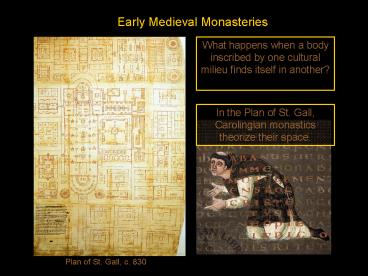Plan of St. Gall, c. 830 PowerPoint PPT Presentation
1 / 34
Title: Plan of St. Gall, c. 830
1
Early Medieval Monasteries
What happens when a body inscribed by one
cultural milieu finds itself in another?
In the Plan of St. Gall, Carolingian monastics
theorize their space.
Plan of St. Gall, c. 830
2
Askesis and Anchoritic Monasticism
St. Anthony Abbot
3
Rock-cut tombs and mastabas at Giza, Egypt
Crypted Space (Lefebvre)
St. Anthony Abbot
4
Stylites also producing a crypted space?
St. Simeon Stylite (390-459)
5
Honorary columns in Roman Cities
Conjectural rendering of the Roman Forum with
honorary columns.
Column of Phocus, erected in 608 C.E.
6
Where would the desert ascetics have been more at
home?
7
Coenobitic Monastic Communities
The coenobium established by the Egyptian St.
Pachomius (286-346) first at Tabennisi (c. 320).
Monastery of St. Anthony Abbot built upon his
burial place in the Eastern Desert of Egypt in
356/7 C.E.
St. Anthony Abbot
8
Coenobitic Monastic Communities
Ruins of St. Simeon Stylite monastery built in
470 Crypted space?
9
Coenobitic Monastic Communities
St. Catherines Monastery, Mt. Sinai, 527-65
10
Design Models for Coenobitic Monastic Communities
a Roman castrum military camp
St. Catherines Monastery, Mt. Sinai, built
527-65.
11
Design Models for Coenobitic Monastic Communities
a Roman villa rustica (Boscoreale, Italy, c. 150
B.C.E.)
St. Catherines Monastery, Mt. Sinai, built
527-65.
12
Dark-Age Coenobites in Northern Europe
Skellig Michael (Michaels Rock), Ireland,
founded 588
13
Dark-Age Coenobites in Northern Europe
Skellig Michael, Ireland, founded 588
14
Dark-Age Coenobites on the Continent
St. Benedict of Nursia, 480-547
Monte Cassino, Italy
Subiaco, Italy
15
Carolingian Plan of St. Gall
What happens when a body inscribed by one
cultural milieu finds itself in another?
St.-Denis
St. Gall
How will the all-male community of Carolingian
monks theorize their space?
Centula
Fulda
16
4th- and 5th-century Christian basilicas in and
around Rome
SS. Marcellino e Pietro on via Labicana
S. Agnese w/ S. Costanza
S. Sebastiano
via Praenestina
S. Lorenzo
via Ardeatina
St. John the Lateran
St. Peters
St. Pauls
Bishops church in Ostia
S. Sabina
17
St. Peters in Rome, 313-333
18
St. Peters in Rome, 313-333
St. Peters w/ annular crypt commis-sioned by
Gregory the Great in 580
19
St. Peters w/ annular crypt built in 580
20
Annular crypt gains Crypt not technically under
ground Chancel raised Permanent altar over relics
St. Peters w/ annular crypt built in 580
21
The Petrine basilica Occidented T-shaped
(transept) Atrium (courtyard) Annular crypt
St. Peters in Rome
St. Gall
22
Early Medieval Basilicas in Europe
San Juan de Baños, in Baños de Cerrato, Spain,
661.
23
Carolingian Empire and Carolingian Renovatio
(renascence) Carolingian period (c. 750-950)
24
Carolingian Monasteries Church and Cloister
cloister
a Roman villa rustica
church
Lorsch, Germany 1st monastery 765-74
25
First Quotation of the Petrine Basilica
Dark-Age St.-Denis, Paris, France, 629-39
St. Peters
Carolingian St.-Denis, 768-75
spolia columns
transept
annular crypt corridor
western towers and tomb (?)
spolia columns
26
Carolingian Crypt of St.-Denis, 768-75
27
Elaborate quotation of the Petrine Basilica plus
double apse
Carolingian Abbey Church at Fulda, Germany
Fulda, 790-819
Fulda today
28
Form and scale of the Petrine Basilica plus
double apse
Carolingian Abbey Church at Fulda
Fulda, 790-819
St. Peters, Rome
double apse
transept
under ground crypt access stairs
Also Scale Occidented
29
Form and scale of the Petrine Basilica plus
double apse
Carolingian Abbey Church at Fulda
30
Carolingian Abbey Church of St.-Riquier, Centula,
France, 790-799
31
How would the all-male community theorize the
Carolingian monastic basilica for the medieval
sex-gender pyramid?
St. Peters, Rome
Carolingian St.-Riquier at Centula
32
Carolingian St.-Riquier at Centula
St. Peters, Rome
33
Carolingian St.-Riquier at Centula
34
Carolingian St.-Riquier at Centula

